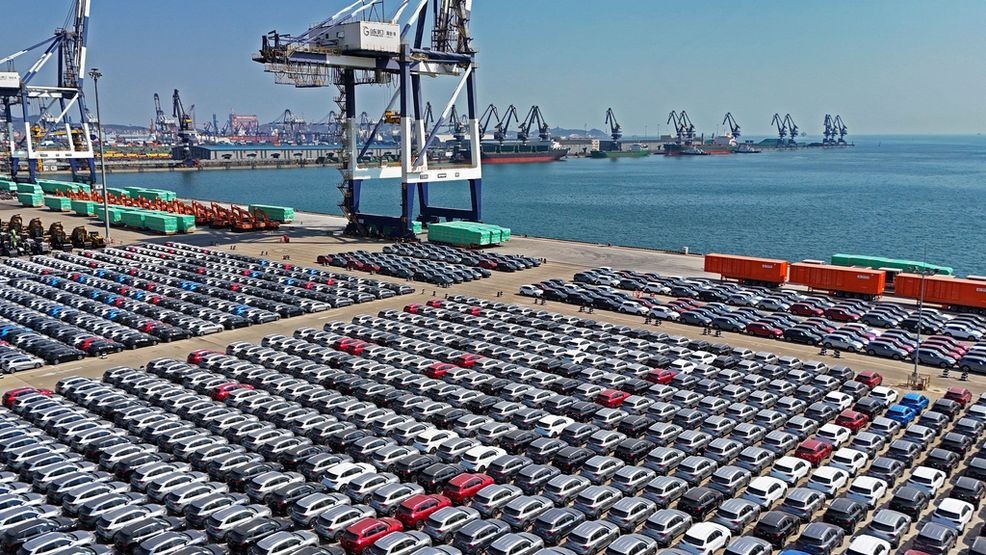WASHINGTON (TNND) — A tit-for-tat trade war with China has continued to escalate this week with tariffs between the world’s two largest economies eclipsing well over 100% as Washington and Beijing refuse to back down in a fight that will have ripple effects on the rest of the world.
China announced on Friday it was increasing tariffs on American goods to 125% from 84% in response to an increasingly aggressive approach to trade with Beijing from the White House. Trump left tariffs in place on China while pausing elevated tariffs on other trading partners for 90 days and has increased them to a total of 145%, a staggering level for a country that is the United States’ third-largest trading partner.
The president has accused Beijing of ripping America off and not abiding by trade deals and taken a hostile approach to relations with China as part of his aggressive increase in tariffs.
It is the latest twist in what has been a whirlwind start to the second Trump administration that has been filled with on-again, off-again tariffs with threats of more to come that has spurred fears of a recession hitting the U.S. and sent consumer confidence plummeting. The 90-day pause has brought little relief for businesses and investors in a chaotic stretch on Wall Street that has gotten frantic as a result with the escalation in the trade war with China.
Companies that have developed complicated supply chains deeply intertwined with China are scrambling to figure out what’s next and debating whether to reimage them to wait things out in hopes of a trade deal being reached.
“The uncertainty is just going to keep everybody on their hands, we’re just going to sit on our hands and wait for this thing to burn itself out,” said Joe LiPuma, clinical associate professor at Boston University’s Questrom School of Business.
President Donald Trump has said his tariffs will help close trade deficits and bring more manufacturing jobs back to the U.S. and steer money away from China as tensions with Beijing have continued to escalate as it grew as a global power and could continue to decline without trade acting as a neutralizing force.
“Hopefully in the near future, China will realize that the days of ripping off the U.S.A., and other countries, is no longer sustainable or acceptable,” Trump said Wednesday.
Beijing has vowed to continue the fight as long as it takes and has given no signals its willing to back down in its combative crusade against Trump’s tariffs. In a statement announcing the latest increase in tariffs against the U.S., China’s Finance Ministry said it would no longer continue to increase its levies against the U.S. and the administration’s continued escalation “will become a joke in the history of the world economy.”
“However, if the U.S. insists on continuing to substantially infringe on China’s interests, China will resolutely counter and fight to the end,” the statement says.
China has moved beyond tariffs by removing U.S. access to products that it controls significant shares of the global market for. Beijing has already instituted export controls on critical minerals as part of the trade war and has other options it could take like cutting off access to its factories that produce a bulk of smartphone and electronics Americans buy and restricting imports of other U.S. goods.
The escalating trade war is likely to significantly reduce the flow of billions of dollars worth of goods between the two countries, including many items that American consumers have been able to get for cheap that has helped keep inflation mostly steady over the last few decades.
“We’re going to end up with more expensive goods that are potentially lower quality, it’s just inefficient,” LiPuma said. “It’s not all going to shift to the U.S., because we don’t have the capability to do a lot of these things anymore. We’ve lost some aspects of workmanship, and we don’t have the time invested in this over years to make these things, so by putting China in that position, China is now establishing more and deeper economic relationships with more countries.”
With tough rhetoric coming from both countries, it’s unclear whether a middle ground can be found between the two and what the interest is in finding a deal. The White House has claimed more than 70 countries have already reached out to make trade agreements as a result of last week’s reciprocal tariffs but has not yet yielded in high-level talks with Beijing.
Trump claimed that Chinese President Xi Jinping wants to make a deal and said the administration is waiting for Beijing to set up a call between the two leaders.
“China wants to make a deal. They just don’t know how quite to go about it,” Trump said on Wednesday during an event at the White House. “You know, it’s one of those things they don’t know quite – They’re proud people.”

